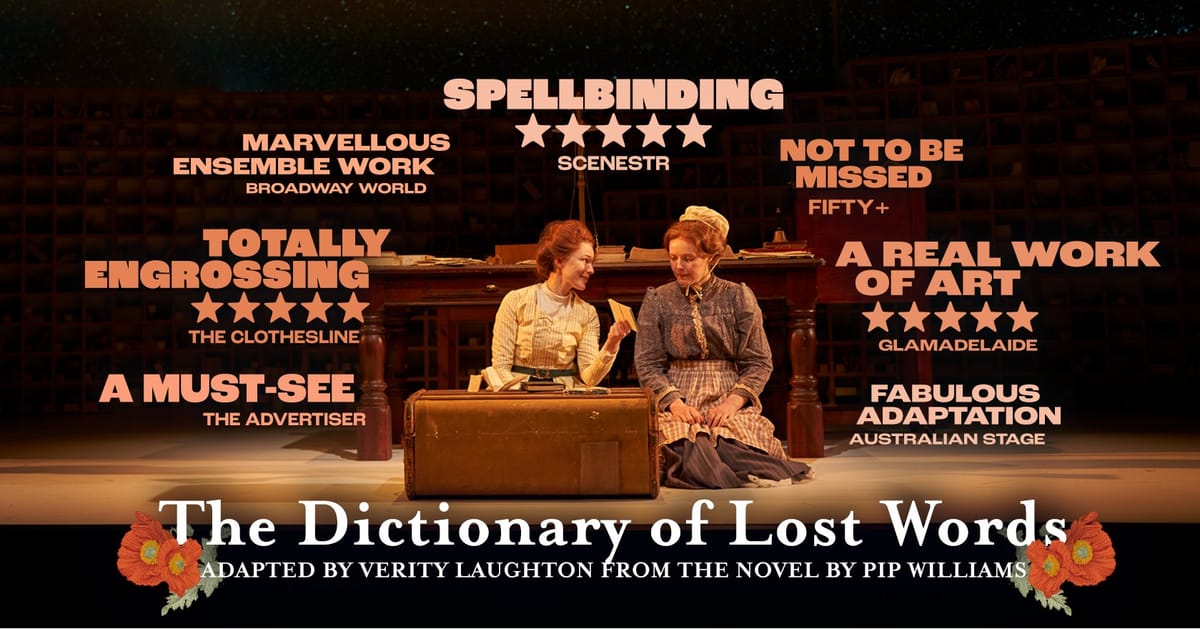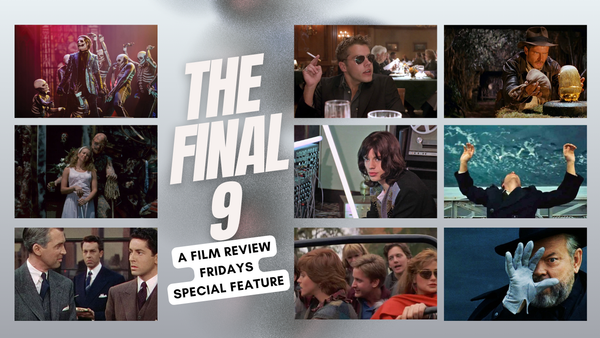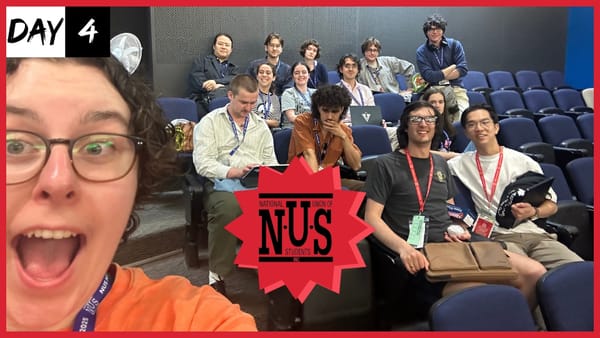Interview with Pip Williams and Verity Laughton: The Dictionary of Lost Words

Pip Williams is the Australian author of the award-winning New York Times bestseller, The Dictionary of Lost Words (2020) and its sequel The Bookbinder of Jericho (2023).
With Verity Laughton’s expert eye and hand, The Dictionary of Lost Words is now a smash-hit stage adaptation that swept all Australian audiences away. The play was presented in association with the State Theatre Company South Australia and Sydney Theatre Company as part of a six-city national tour.
Following the life of the young girl, Esme Nicoll, this text explores the patriarchal English society as well as broader themes of love and curiosity through the story of constructing the first English dictionary in Oxford. Guiding the audience through the lives of the Suffragist women, the first World War and the hierarchical Victorian society, all the way to modern Australia, this story compels one to ask: “What really happened?”
For more text analysis, visit our article: The Dictionary of Lost Words Leaps Gracefully From Page to Stage.
Editors Asher Wood and Serena Emanuele had the chance to meet with both Pip Williams and Verity Laughton for a quick interview. Here's how it went!
Interview with Pip Williams and Verity Laughton
SERENA: You first published a poem in the magazine Dolly and that came as a personal expression and not from an ambition to become a writer. Despite being a successful novelist now, do you still have that need to write for yourself?
PIP: Yes. Do you guys remember Dolly or are you too young?
SERENA: No, I don’t.
ASHER: No.
PIP: Oh no! You’re too young. So, that poem came from a place of teenage angst and I’ve been writing since I was a little girl. I’ve always written to express how I feel and to try and understand how I feel to myself, how I think about stuff and it’s just a way of sorting stuff out. And, even though I spend my days writing novels mostly, there is always a part of most days where I’m writing in a journal. What I’m writing in my journal is for nobody’s eyes but mine. So, yes, I still do that. Although I don’t write poetry anymore – that poem was the high point and then it all went downhill from there [she said chuckling].
SERENA: Did your novel, The Dictionary of Lost Words, start like that? Did you start it with a need to understand what you had discovered?
PIP: That’s a really good question. No, not necessarily. I was really interested in whether or not the dictionary was a gender-biased text because I had read a non-fiction book about the making of the dictionary. And, I hadn’t thought about it before that, that a word would need to be written down to be in the dictionary. And, given the dictionary was a project of the 19th century, I realised that most of the words that had been written down had been written by men, and all of the people defining those words were men. I just wondered whether this text – that I never questioned – in fact, I should be questioning.
PIP: I couldn’t find the answers to that in the usual way: going to the library or googling or whatever. So, I decided to start writing a story. I’ve always wanted to write a novel. So, I thought: “What if I put a fictional girl under the sorting table where all the words in the English language are being defined?” I imagined how she would’ve grown into a young woman in that context and that environment. I imagined how she might affect the words and how the words might affect her because there was no evidence about how the women might’ve affected the words. So, I had to imagine it to some extent. But, I did think of it, once it got started as a novel, that I wanted to share it with people. So, yes, it wasn’t just for myself at that point
SERENA: Do you still feel like you put a bit of yourself into Esme as a character, through her curiosity for words?
PIP: Yes and no. I used to say that she’s nothing like me, but I think that I didn’t understand her or myself well enough. She’s a lot like me but she has characteristics that I don’t have. And, that was the joy of writing a character that is better than you, different from you or that has different strengths that you don’t have. I don’t know about other writers but it was nice to explore other personalities and try to understand how they work. She was more precocious than I was as a child. She was far more literate – I’m actually dyslexic, so I gave that characteristic. Yes, so, it’s nice to create a character that is a mixture of strangeness and familiarity.
SERENA: I feel like that’s exactly it: exploring oneself in writing but also those aspects that we’re not quite sure of. So, how did you feel seeing your text come to life on the stage?
PIP: Verity Laughton is the playwright and I was introduced to Verity by Mitchell Butel from the South Australian Theatre Company [State Theatre Company South Australia]. He suggested that Verity would be the perfect person to translate this story and adapt it to stage – and, I knew from the first five minutes of meeting with her that she was. She had done a really close reading of the book and she spoke to me about it in a way that I totally understood and was familiar with because they were my thoughts. So, I knew that the novel would be in safe hands and to be honest, I didn’t have anything to do with it really except for a few fact checking moments.
PIP: The theatre adaptation is a new creative work, and I know it follows the story quite closely, but it has many more dimensions than a book. The stage can just do things that a book can’t. I’m just eternally grateful that Verity and the whole production team have created such a beautiful adaptation to the stage – it’s mindblowing really. I’ve seen it ten times now.
SERENA: Verity, what inspired you to adapt the book?
ASHER: What reeled you in?
VERITY: Well, I read the book and listened to it as well. A few friends suggested I do it and so when Mitchell rang me up – it would be one those ones you would hesitate on but I just knew we would be a good fit, and we are. Because one thing I think Esme, Pip and I share is a complete obsession with words. It’s almost like synesthesia – I feel words almost like a three dimensional, physical object. And, I don’t know if you do [directed to Pip] but Esme has that same sort of … they’re like little jewels. I knew I’d be writing partly with that obsession, so I said yes straight away because we were mostly on the same page. And, what Pip has done is create this amazing world where you have little individual life and an extraordinary, very original protagonist, and then you have the intellectual story of the making of the Oxford English Dictionary, and then you have the socio-political story of the Suffragist movement, World War one and Oxford as the centre of intellectual life in England. So, that’s already three levels of stories that you’re working with immediately and that gives a great richness and a sense of complexity to the world we can create. So, it was a lovely challenge – I’m not going to say it was easy, but it was heaps fun. And, we just got this wonderful creative team, didn’t we?
PIP: Yes!
VERITY: I mean, Jessica Arthur is a beautiful director. When I was first looking at the book and thinking: “How will I start? How will I do this?” I just got a flash of the beautiful spies of Oxford. Oxford is an aesthetic marvel. And, I just imagined suddenly, the characters moving, flowing, through, in and around Oxford. What Jess and the rest of the creative team have managed to do is recreate that original idea of ‘flow’ – the moving of the stage picture is always flowing in and out, and that’s represented in the set as well. The set is pretty good, I have to say. Jonathan Oxlade did a beautiful job at representing the scriptorial and then you’ve got Trent Suidgeest who did the lights. He [Trent] made that static stage flow through the way he used the lights. And again, through the music, by Max Lyandvert, where you kind of have this flow of in and out. I’ve written a particular folk song into the script and Max has extracted and played with it, and used it to underpin the emotional flow. So, the whole thing stems from the idea of flow. I think I’ve digressed slightly from your original question [chuckles].
SERENA: No, it’s all great stuff!
ASHER: What do you hope that the audience takes away from the show?
VERITY: I hope that they will take away the experience of being inside Esme’s world.
SERENA: That’s awesome. How about you, Pip?
PIP: I just hope they appreciate it in some ways. I actually hope that they don’t think about anything other than the story.
SERENA: Interesting!
PIP: And, I know that that will be the experience. I’ve seen it ten times [laughs] and watched and listened to audience members – I think it won’t take them very long to just be there because of the whole production value. It’s a very high production value – it’s a sumptuous show.
ASHER: Love that word.
PIP: While the audience will bring their imagination, there is so much for their imagination to work with. I just hope they leave with the same awe I felt when I saw it for the first time.




